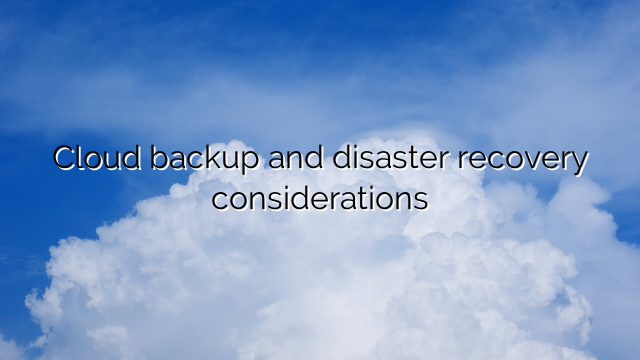The current cloud backup solutions has replaced the traditional tape and hardware-dependent techniques. As cloud offers an agile approach to recovering data in the advent of a catastrophe, organizations are preferring the option. Even though cloud has become more streamline, there are still concern as to relying completely on cloud-based backup solutions for data recovery and to maintain business continuity.
Adding more layers of protection to otherwise simply backup solution can improve data retrieval and efficiency level such as combination of cloud-based disaster recovery and backup. With this hybrid solution, you need to ensure that it fits your budget criteria and provides optimum performance. Here are a few factors to consider when migrating to a more advanced back up and recovery services.
Cloud-cost analysis: Implementation of this hybrid cloud recovery solution comes down to one thing: budget. Check if the technology or the integration you are looking to implement fits your budget or not. This should include backing up and recovering files, databases, server images, round-the-clock technical support and the like.
Backup and DR SLAs: Before signing up with any organization for cloud BDR solution, make sure to fully analyze the fine print in the SLAs (Service Level Agreements). The SLA should specify everything right from essential service-oriented features such as Recover Time Objective (RTO) and Recovery Point Objective (RPO) to more basic details. In addition, if you are seeking to deploy additional service from BRD, ensure to put it in writing as well, which will eliminate last moment surprises.
Taking a visit at the data center facility: Instead of making a deal over a phone call or video conference calls, have a face-to-face discussion that can help you make a better decision. Checking out the service provider’s facility will give you an idea and more information on how well they have designed and secured their infrastructure concerning to protect customers’ valuable data.
Security considerations: Experts recommend that in case of cloud storage, users must encrypt the data at no less than 256-bit Advanced Encryption Standard (AES) levels before it steps out of your network. This is one of the best approaches to ensuring your data remains secure when at transit or rest. Make sure not to allow your service provider to have the decryption keys but only your company.
Efficient user experience: Using cloud solution means being able to access the data and service from any location with any given device via network connection. Advanced BDR cloud solution enables data download without retrieving an entire server image at prior. In addition, also ensure that the solution is compliant with the required set of agreements and regulations. Apart from all this, round-the-clock technical assistance is a must from service provider to provide customers better experience.
For more information contact:
Web Werks is an India-based CMMI Level 3 Web Hosting company with 5 carrier neutral data centers in India and USA. Started in 1996, Web Werks has served several Fortune 500 companies with successful projects in the areas of Web Hosting, Data Center Services, Dedicated Servers, Colocation servers, Disaster Recovery Services, VPS Hosting Services, and Cloud Hosting.
Web Werks India Pvt. Ltd.
+91 8828335555
www.webwerks.in
